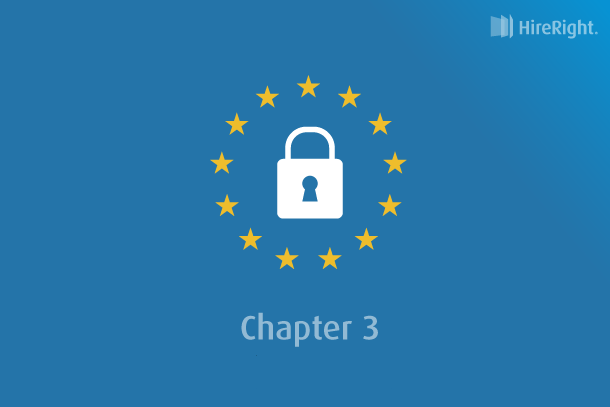GDPR: What Happens Now? Chapter 3 – Helping Businesses Adhere to the GDPR
In this article, Steve Girdler, Managing Director for EMEA and APAC, and Caroline Smith, Associate General Counsel for EMEA and APAC, discuss how HireRight can help businesses with their adherence to the GDPR.

Welcome to our third video about the effects of the GDPR on the background screening industry. The second video – Chapter 2 – Background Screening Partners – looked at what companies are looking for from their background screening provider when it comes to the GDPR.
In this video, Steve Girdler, Managing Director for EMEA and APAC, and Caroline Smith, Associate General Counsel for EMEA and APAC, discuss how HireRight can help businesses with their adherence to the GDPR.
Key Points
It is advisable to have a screening policy and a recruitment policy that’s made available to all your candidates, taking them through the journey from the point that they first submit their CV.
This allows candidates who do not wish to be screened to withdraw from the process at this point.
It is really important, particularly in Europe, to get works councils to ratify your background screening process.
It can be useful to explain to your candidates who your background screening provider is, so they can feel more comfortable with the screening process when it begins.
By introducing background screening to candidates in the early stages of recruitment, you could have a much smoother recruitment process and prevent issues further down the line.
Chapter 3 – Helping Businesses Adhere to the GDPR
This video is the third of four bite-sized snippets where HireRight’s Steve Girdler and Caroline Smith discuss background screening in the world post-GDPR, in particular, the impact that the GDPR has and will have on the background screening industry.
Watch the video here.
Helping Businesses Adhere to the GDPR Transcript
STEVE
Background screening is just one part of the recruitment process, which often comes right at the very end. How does what we do help businesses with their adherence to GDPR, as well as making the recruitment process better?
—
CAROLINE
When we think about the GDPR, we talk a lot about transparency - informing a candidate about what’s going to happen to their data, and how their future employer, if they’re lucky enough to get the job, is going to use that data.
The background screening journey actually starts a lot earlier than you might think, when the candidate invite goes out to a candidate to fill in the form for our process.
We’ve been talking with our customers a lot about how you build that process in right at the start. We’re really recommending to anyone that’s recruiting that they have a screening policy and a recruitment policy that’s made available to all their candidates, taking them through the journey from the point that they first submit their CV. This means that if a candidate has something that they don’t want to be revealed in screening, they are able to drop out of the process at this point, preventing problems further down the line.
It’s important to mitigate the thorny issues of the GDPR and not cause yourself problems. If you have a robust policy in place that is telling the candidate what’s going on, then they will feel like they’re being brought into a process.
One of the other things that is really important, particularly in Europe (for example in Germany, Italy, and Spain) is consulting with works councils. A works council is the voice of the employees, and when it comes to screening, particularly in jurisdictions where there’s much more sensitivity around data, it’s really important to get the mouthpiece of the employee on board, ratifying any screening programs or recruitment programs that you actually have.
Whilst background screening itself may usually be at the end of the recruitment process, actually, if you start to notify the candidate about it and bring in your employee representatives at the early stages of recruitment, you could have a much smoother process.
STEVE
It’s also about transparency in this whole process. From a GDPR perspective and also for a business process, transparency means that if you tell someone at the beginning of the recruitment process that at the very end your offer may be subject to screening, they have the opportunity to understand what that actually means.
By the organisation not only telling the candidate which documents they need to provide, but actually, who they are using as a partner, for example, HireRight, the candidate will know that if they do get offered the job and that it’s subject to screening, they will know who HireRight is and they understand what they’ve got to do. Transparency is critical.
Release Date: December 5, 2018

HireRight
HireRight is a leading provider of on-demand employment background checks, drug and health screening, and electronic Form I-9 and E-Verify solutions that help employers automate, manage and control background screening and related programs.